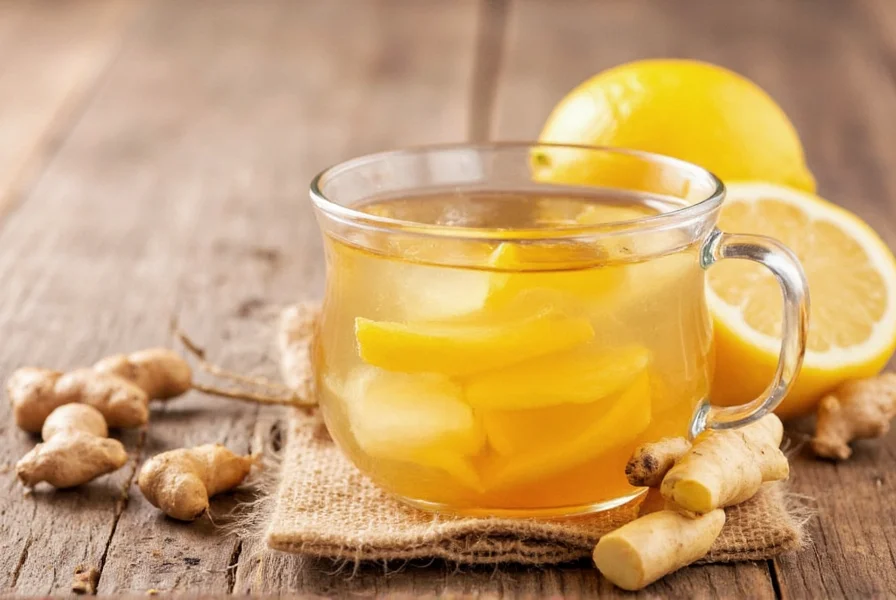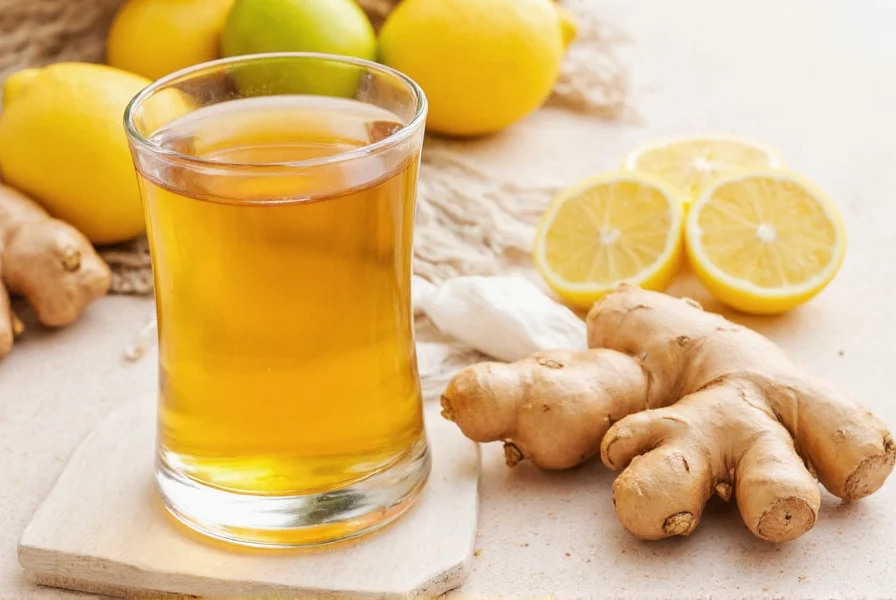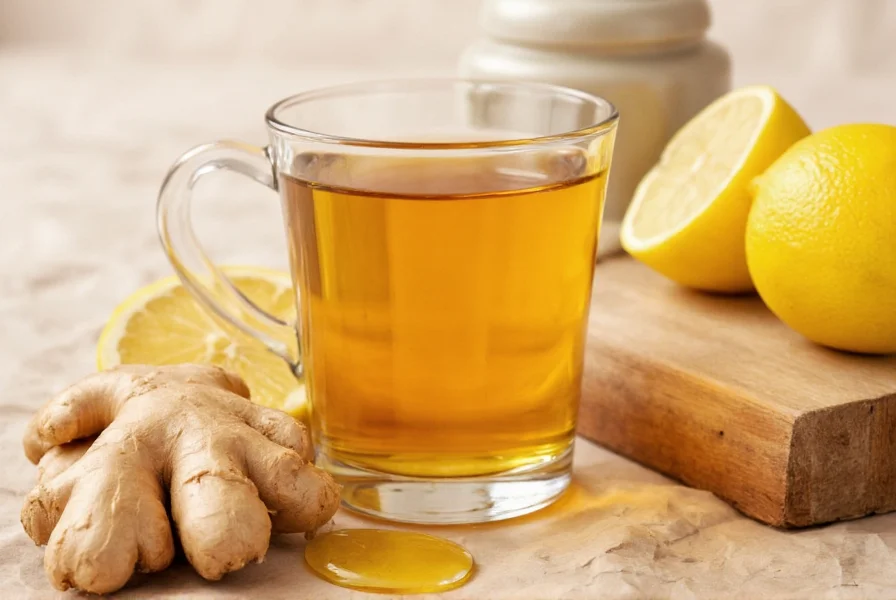For centuries, cultures worldwide have turned to ginger tea with lemon and honey as a comforting home remedy. This simple combination blends three natural ingredients with individual health properties that may work synergistically. While not a medical treatment, this beverage provides hydration and potential symptomatic relief during minor illnesses. Understanding the science behind each component helps separate evidence-based benefits from popular myths.
The Science Behind Each Ingredient
Ginger contains bioactive compounds like gingerol that demonstrate anti-inflammatory and antioxidant effects in scientific studies. Research published in the Journal of Medicinal Food indicates ginger may help reduce nausea and muscle pain. Lemon contributes vitamin C and flavonoids that support immune function, though the amount in a single cup of tea provides minimal daily value. Honey, particularly raw varieties, contains antimicrobial properties and has been shown in clinical trials to soothe coughs more effectively than some over-the-counter medications.
| Ingredient | Key Compounds | Research-Supported Benefits |
|---|---|---|
| Ginger | Gingerols, shogaols | Nausea reduction, anti-inflammatory effects |
| Lemon | Vitamin C, flavonoids | Antioxidant properties, immune support |
| Honey | Hydrogen peroxide, flavonoids | Cough suppression, wound healing properties |
How to Prepare Ginger Tea Lemon Honey Properly
Creating an effective ginger tea lemon honey beverage requires attention to preparation methods. Start with fresh ginger root—about one inch sliced thin or grated. Simmer in 2 cups of water for 10-15 minutes to extract maximum compounds. Remove from heat before adding lemon juice (half a lemon per serving) and honey (one to two tablespoons). Adding honey to boiling liquid destroys beneficial enzymes. For optimal ginger tea lemon honey benefits, consume while warm but not scalding.

When Ginger Tea Lemon Honey Works Best
This natural remedy shows most promise for specific situations. Clinical evidence supports ginger lemon honey tea for cold relief, particularly for soothing sore throats and reducing cough frequency. The Cochrane Database of Systematic Reviews notes honey's effectiveness for nighttime coughs in children over one year old. Many users report ginger tea with lemon and honey for nausea provides relief from morning sickness or motion sickness. However, it's crucial to understand this beverage complements—not replaces—medical treatment for serious conditions.
Important Safety Considerations
While generally safe, ginger tea lemon honey has important limitations. Infants under one year should never consume honey due to botulism risk. People with ginger allergies or those taking blood thinners should consult doctors before regular consumption. Excessive ginger intake (more than 4 grams daily) may cause digestive issues. The sugar content in honey matters for diabetics—consider reducing honey quantity or using alternatives. Remember that ginger tea with lemon and honey for weight loss has minimal direct impact; any benefits come from replacing sugary beverages.
Evidence vs. Popular Claims
Many online sources exaggerate ginger lemon honey tea health benefits. Scientific research supports modest anti-inflammatory and soothing effects, but doesn't confirm dramatic claims about detoxification or significant immune boosting. A 2020 review in Nutrients found ginger shows promise for nausea relief but noted limited evidence for other popular claims. The vitamin C in lemon tea provides minimal daily value—about 10-20mg per cup compared to the recommended 75-90mg daily intake. Understanding these distinctions helps set realistic expectations for this traditional remedy.

Optimizing Your Ginger Tea Experience
Enhance your ginger tea lemon honey recipe with evidence-based additions. Turmeric (with black pepper) increases anti-inflammatory effects. Adding cinnamon may provide additional antioxidant benefits. For ginger tea lemon honey for cold and flu, consider including a pinch of cayenne pepper to potentially boost circulation. Timing matters—consuming ginger tea with lemon and honey before bed may improve sleep quality during illness, while morning consumption could support digestion. Remember that consistency matters more than single servings for potential cumulative benefits.
Conclusion: A Balanced Perspective
Ginger tea with lemon and honey represents a time-tested home remedy with modest scientific backing for specific uses. Its greatest value lies in providing hydration, soothing irritated tissues, and potentially reducing symptom severity during minor illnesses. When prepared properly as part of a healthy lifestyle, this simple beverage offers a comforting, low-risk option for symptom management. However, it should never replace professional medical advice or treatment for serious conditions. Understanding both the genuine ginger tea lemon honey benefits and limitations allows for informed, realistic use of this popular natural remedy.
Frequently Asked Questions
How often can I drink ginger tea with lemon and honey?
Most adults can safely consume 1-3 cups daily. Excessive ginger intake (more than 4 grams) may cause digestive issues. Those with medical conditions should consult their healthcare provider about appropriate frequency.
Can children drink ginger tea with lemon and honey?
Children over 1 year can consume this tea, but never give honey to infants under 12 months due to botulism risk. For children, reduce honey quantity and ensure the tea isn't too hot. Consult a pediatrician before regular use for children under 2.
Does ginger tea with lemon and honey really help with colds?
Research shows it may provide symptomatic relief—honey soothes coughs, ginger reduces inflammation, and lemon offers vitamin C. A 2014 Cochrane review found honey more effective than placebos for nighttime coughs. However, it doesn't cure colds or significantly shorten illness duration.
When is the best time to drink ginger tea with lemon and honey?
Morning consumption may support digestion, while evening intake can soothe coughs and promote rest. For nausea relief, drink 20-30 minutes before potential triggers. During illness, spacing consumption throughout the day maintains symptom relief. Avoid drinking too close to bedtime if citrus affects your sleep.
Can I use this remedy while pregnant?
Moderate ginger consumption (up to 1 gram daily) is generally considered safe during pregnancy for nausea relief. However, consult your healthcare provider first, especially if you have a history of miscarriage or are near term. Avoid excessive amounts as high ginger doses might affect fetal development.











 浙公网安备
33010002000092号
浙公网安备
33010002000092号 浙B2-20120091-4
浙B2-20120091-4